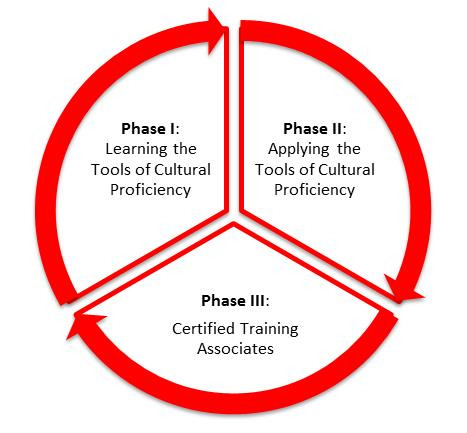You are here
Program Model
Sustainable systemic equity reform requires deep implementation and a commitment to change. Districts and schools will engage in the three phases of the Culturally Proficient Educational Practice Implementation Plan over a three-year period:
- Phase One: Learning the Tools of Cultural Proficiency
- Phase Two: Applying the Tools of Cultural Proficiency
- Phase Three: Certified Training Associates
Core Program Component

Phase I: Learning the Tools of Cultural Proficiency (3 days)
In Phase I, cohorts of district office and site administrators, teachers, staff members, and parents will focus on one essential question: What is Cultural Proficiency and why do we need it? The 3-day session will include an overview of the four tools of Cultural Proficiency and will explore educators’ deeper responses to educational access and equity gaps based on the communities they serve. Depending on the cohort they are a part of (Cohort 1A for leaders or 1B for teachers and support staff), participants will engage in a book study around Culturally Proficient Leadership or Cultural Proficiency: A Manual for School Leaders.
Phase II: Applying the Tools of Cultural Proficiency (3 days)
Cohort members that have completed Phase I and wish to deepen their learning and move toward action will focus on one essential question: How do we apply the Tools of Cultural Proficiency? Participants will study their school or district context, collect site-based data, and analyze how the Guiding Principles and Essential Elements of Cultural Proficiency can be used to inform their needs and practice. Participants will engage in a custom book study around Culturally Proficient Learning Communities or Culturally Proficient Inquiry and work towards completing a Culturally Proficient Inquiry and Action Plan.
Phase III: Certified Training Associates (4 days)
Cohort members that have completed Phases I and II and aim to build the internal capacity necessary to continue and sustain the work of culturally proficient educational practice within their system will focus on one essential question: How do I become a facilitator of culturally proficient educational practice?
The most important asset of a culturally proficient trainer is knowledge of self. Facilitators of cultural proficiency must ascertain precise knowledge of who they are as individuals. Self-critique, self-directedness and group interactions heighten this understanding to better meet group needs. The CTA professional learning series will guide participants towards understanding their own personal learning styles, biases, assumptions, beliefs, and values in order to heighten their effectiveness in assisting groups on their journey toward cultural proficiency.